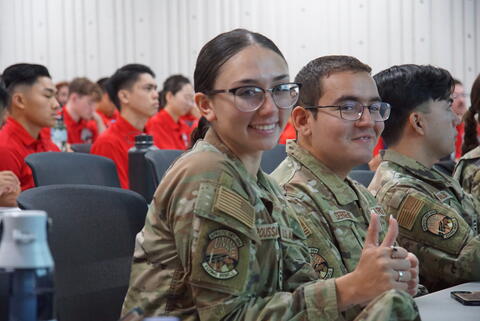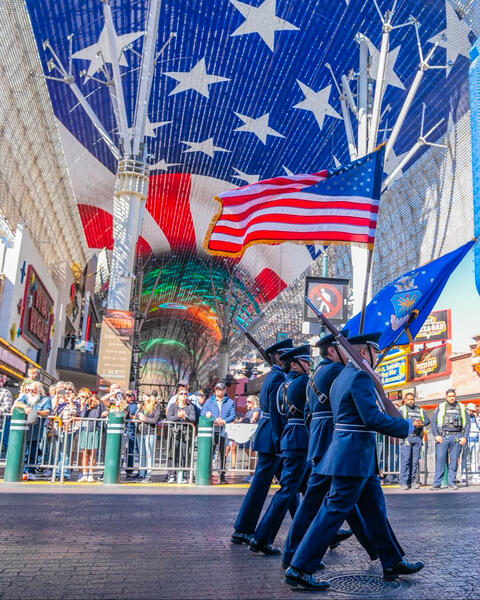Day in the Life as a Cadet
On a consistent basis, the Flying Rebels Cadets are faced with the challenges of being excellent students while developing as the next generation of leaders not only for the United States Air Force and Space Force, but for their respective communities. The cadets themselves are proud to display for you a day in their lives. From orientation to graduation and commissioning, their experiences are a snapshot of what prospective cadets can expect as a Flying Rebel in AFROTC's Detachment 004.
Cadets here at Detachment 004 at the University of Nevada Las Vegas talk about their time in ROTC and what it has meant to them!


Course Descriptions
Air Force Aerospace Studies
The Foundation of the U.S. Air Force (General Military Course)
A survey course designed to introduce students to the U.S. Air Force and Air Force Reserve Officer Training Corps. Featured topics include mission and organization of the Air Force, officership and professionalism, military customs and courtesies, Air Force officer opportunities, group leadership problems, and an introduction to communication skills. Leadership Laboratory is mandatory for Air Force ROTC cadets wishing to pursue commission and complements this course by providing cadets with followership experiences. AES 120 is a continuation of AES 110. Leadership Laboratory is mandatory for AFROTC cadets wishing to pursue commission and complements this course by providing cadets with followership experiences.
Leadership Laboratory
Consists of Air Force customs, courtesies, health, mandatory physical fitness, field training orientation, drill, and ceremonies. Cadets in this course are focused on building their foundations of military discipline while learning the basics of followership.
The Evolution of USAF Air and Space Power (General Military Course)
The AES 230 course is designed to examine the general aspects of air and space power through a historical perspective. Using this perspective, the course covers a time period from the first balloons and dirigibles to the first implementation of unmanned combat air vehicles (UCAV) in the global war on terrorism. Historical examples are provided to extrapolate the development of Air Force capabilities (competencies) and missions (functions) to demonstrate the evolution of today’s USAF air and space power. Furthermore, the course examines several fundamental truths associated with war in the third dimension, such as principles of war and tenets of air and space power. As a whole, this course provides knowledge of air and space power from an institutional, doctrinal, and historical perspective. In addition, the students will continue to discuss the importance of the Air Force core values, through the use of operational examples and historical Air Force leaders, and will continue to develop their communication skills. AES 2400 is a continuation of AES 230. Leadership Laboratory is mandatory for AFROTC cadets wishing to pursue commission and complements this course by providing cadets with followership experiences.
Leadership Laboratory
Consists of Air Force customs, courtesies, health, mandatory physical fitness, drill, ceremonies, and field training orientation. Cadets in this course are focused on mastering their foundations of military discipline and followership in preparation for field training.
Field Training
AFROTC Field Training is a congressionally mandated evaluation of cadets' preparedness to progress into the Professional Officer Course, or “upper-class,” where they will lead at their detachments as they progress toward becoming a leader in the U.S. Air Force and the U.S. Space Force. Normally conducted between a cadet's sophomore and junior years, field training is designed to place cadets in a rigorous and unfamiliar training environment, testing them physically, mentally and emotionally.
During phase I, cadets are evaluated on their preparation and individual readiness. This includes a field training officer interview, academic exams, flight drill evaluations and a physical fitness assessment. In phase II, cadets are trained on battlefield skills such as land navigation, tactical combat casualty care and small-unit tactics. In phase III, cadets will be evaluated leading their teams through leadership reaction course events and mission scenarios in a simulated deployed environment. Finally, in phase IV, cadets begin their entry into the AFROTC POC by completing a tactical-level, leadership-training course.
AFROTC Field Training is a congressionally mandated evaluation of cadets' preparedness to progress into the Professional Officer Course, or “upper-class,” where they will lead at their detachments as they progress toward becoming a leader in the U.S. Air Force and the U.S. Space Force. Normally conducted between a cadet's sophomore and junior years, field training is designed to place cadets in a rigorous and unfamiliar training environment, testing them physically, mentally and emotionally.
During phase I, cadets are evaluated on their preparation and individual readiness. This includes a field training officer interview, academic exams, flight drill evaluations and a physical fitness assessment. In phase II, cadets are trained on battlefield skills such as land navigation, tactical combat casualty care and small-unit tactics. In phase III, cadets will be evaluated leading their teams through leadership reaction course events and mission scenarios in a simulated deployed environment. Finally, in phase IV, cadets begin their entry into the AFROTC POC by completing a tactical-level, leadership-training course.
Air Force Leadership Studies I (Professional Officer Course)
Designed to provide AFROTC cadets the opportunity to study and master the leadership, management and communication skills required of successful Air Force officers. Participate and interactive learning methodologies are used throughout to ensure students have internalized and can apply concepts being studied. Leadership Laboratory is mandatory for Air Force ROTC cadets wishing to pursue commission and complements this course by providing cadets with followership experiences.
AFROTC Leadership Lab III-A
Study of advanced leadership topics such as: planning and controlling the military activities of the AFROTC cadet corps, preparing and presenting military briefings and written communications, and providing guidance, direction, and information to increase the understanding, motivation, and performance of other cadets. These courses are graded Pass/Fail.
Air Force Leadership Studies II (Professional Officer Course)
Designed to provide AFROTC cadets the opportunity to study and master the leadership, management and communication skills required of successful Air Force officers. Emphasis placed on the study of military ethics, leadership accountability and professional relations. Participative and interactive learning methodologies used throughout.
AFROTC Leadership Lab III-B
Study of advanced leadership skills such as: planning and controlling the military activities of the AFROTC cadet corps, preparing and presenting military briefings and written communications, and providing guidance, direction and information to increase the understanding, motivation, and performance of other cadets. These courses are graded Pass/Fail.
National Security Affairs/Preparation for Active Duty I (Professional Officer Course)
Provides advanced AFROTC cadets the opportunity to study the national security policy process, the make-up and joint nature of the U.S. military and pertinent regional issues. Participative and interactive learning methodologies used throughout. Continued emphasis placed on developing effective leadership and communication skills. Leadership Laboratory is mandatory for Air Force ROTC cadets wishing to pursue commission and complements this course by providing cadets with followership experiences.
AFROTC Leadership Lab IV-A
Provides senior AFROTC cadets advanced leadership experiences involving: planning and controlling military activities of the AFROTC cadet corps, preparing and presenting military briefings and written communications, and providing guidance, direction and information to increase the understanding, motivation, and performance of other cadets. These courses are graded Pass/Fail.
National Security Affairs/Preparation for Active Duty II (Professional Officer Course)
Provides advanced AFROTC cadets the opportunity to study regional issues impacting the U.S. Air Force, the unique aspects of the profession of arms and prepare them to enter active duty as an Air Force officer. Continued emphasis placed on developing effective leadership and communication skills. A weekly Leadership Laboratory is mandatory.
Provides senior AFROTC cadets advanced leadership experiences involving: planning and controlling military activities of the AFROTC cadet corps, preparing and presenting military briefings and written communications, and providing guidance, direction and information to increase the understanding, motivation, and performance of other cadets. These courses are graded Pass/Fail.